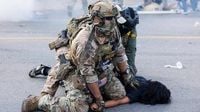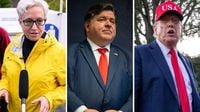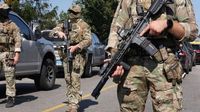On Monday, October 6, 2025, the simmering tension between state and federal authorities erupted into a full-blown legal and political battle as Illinois and the city of Chicago filed a lawsuit to halt President Donald Trump’s plan to deploy National Guard troops to the city. The move came just hours after a federal judge in Oregon temporarily blocked a similar deployment to Portland, escalating a confrontation that has been building for weeks amid aggressive immigration enforcement operations in major U.S. cities.
The lawsuit, filed in the U.S. District Court for the Northern District of Illinois, contends that the deployment of federalized troops to Illinois is “patently unlawful,” and asks the court to stop the federalization and deployment of National Guard members not just to Illinois, but more broadly. According to CNN, the complaint names President Trump, Department of Homeland Security Secretary Kristi Noem, and Department of Defense Secretary Pete Hegseth as defendants. The legal challenge is the latest in a string of state and local efforts to push back against what Democratic leaders describe as federal overreach and political grandstanding.
Illinois Governor JB Pritzker, a Democrat, has been at the forefront of the opposition. In a statement posted on the social platform X, Pritzker decried Trump’s plan to federalize 300 Illinois National Guard troops and send an additional 400 from Texas as “unlawful and unconstitutional.” He further accused the president of using members of the military as “political props,” charging that Trump was attempting to “justify and normalise the presence of armed soldiers under his direct command.” Pritzker went so far as to liken the potential deployment to an “invasion,” calling on Texas Governor Greg Abbott to block the move. Abbott, however, supported the crackdown, posting a photo of Texas National Guard members boarding a plane, though he did not specify their destination.
The White House has defended its actions, with spokesperson Abigail Jackson stating, “Amidst ongoing violent riots and lawlessness, that local leaders like Pritzker have refused to step in to quell, President Trump has exercised his lawful authority to protect federal officers and assets.” The administration has repeatedly painted Democrat-led cities as beset by violence and disorder, arguing that federal intervention is necessary to restore order—a narrative that state and local officials have vigorously rejected.
The legal wrangling in Chicago mirrors events in Portland, Oregon, where U.S. District Judge Karin Immergut, a Trump appointee, granted a temporary restraining order on Sunday, October 5, 2025, blocking the deployment of National Guard troops from any state or the District of Columbia to Oregon. According to the Associated Press, Immergut appeared incredulous that the administration had attempted to send troops from California and Texas to Oregon just hours after her initial ruling. “Aren’t defendants simply circumventing my order?” she asked. “Why is this appropriate?” The judge concluded that the protests in Portland “did not pose a danger of rebellion,” and that the president appeared to have “exceeded his constitutional authority” by federalizing troops under these circumstances.
President Trump, for his part, has remained defiant. In remarks to reporters in the Oval Office on Monday, he said, “We have an Insurrection Act for a reason. If I had to enact it, I’d do that.” He added, “If people were being killed and courts were holding us up, or governors or mayors were holding us up, sure, I’d do that.” The Insurrection Act, a federal law dating back to 1807, allows the president to deploy the military domestically in cases of rebellion or insurrection, but its use is rare and highly controversial.
Since the start of his second term in January 2025, Trump has expanded the use of the military in domestic affairs, especially to bolster immigration enforcement and crack down on protests. Troops have already been sent to Los Angeles and Washington, D.C., and the president has floated deployments to at least eight other major cities, including Baltimore, Memphis, New Orleans, Oakland, San Francisco, and more. In September, a federal judge ruled that the Trump administration “willfully” broke federal law by deploying Guard troops to Los Angeles amid protests over immigration raids, according to multiple reports.
The situation on the ground in Chicago has grown increasingly tense. Over the weekend, a woman was shot by federal agents on the city’s southwest side after Border Patrol agents were boxed in by 10 vehicles. The Department of Homeland Security said the shooting occurred after agents were “rammed by vehicles and boxed in by 10 cars.” The woman survived and was taken into federal custody. Chicago Police Superintendent Larry Snelling explained that officers were redeployed from other parts of the city to assist the agents and that 27 officers were affected by tear gas during the confrontation. “We cannot become a society where we just decide to take everything in our own hands and start to commit crimes against law enforcement,” Snelling said, while also acknowledging the challenges of balancing non-cooperation with federal immigration enforcement and maintaining public safety.
Protests have been frequent near an Immigration and Customs Enforcement (ICE) facility outside Chicago, particularly in Broadview. On Friday, October 3, 2025, authorities arrested 13 protesters near the facility, and the American Civil Liberties Union (ACLU) of Illinois filed a lawsuit against the Trump administration and several agencies, accusing them of using indiscriminate and violent force against peaceful protesters and journalists. “The First Amendment protects speech and peaceful assembly—not rioting,” responded DHS spokesperson Tricia McLaughlin, defending federal agents’ actions.
Chicago Mayor Brandon Johnson responded to the escalating federal presence by signing an executive order on October 6, 2025, barring federal immigration agents and others from using city-owned property—such as parking lots, garages, and vacant lots—as staging areas for enforcement operations. Meanwhile, Mayor Katrina Thompson of Broadview has limited protest hours at the ICE site, citing safety concerns.
Beyond Chicago and Portland, the Trump administration’s strategy has been to surge federal law enforcement and immigration agents to cities nationwide. In one high-profile incident last week, federal agents reportedly rappelled from Black Hawk helicopters as they stormed a five-story apartment building in Chicago—a scene that, according to NewsNation, was observed by invited media.
Despite the administration’s claims of rising lawlessness, official data tells a more nuanced story. For example, Portland has actually seen a 51% decrease in homicides from January through June 2025 compared to the same period in 2024, according to the U.S. Attorney’s Office in Oregon. Since June, federal agents have charged 30 people with federal crimes related to protests at the Portland ICE building, including assaulting federal officers and depredation of government property.
As legal battles play out in courtrooms from Chicago to Portland, the clash over federal authority, states’ rights, and the limits of presidential power continues to reverberate. With a Thursday court hearing scheduled in Illinois and a midnight Wednesday deadline for the federal government to respond to the lawsuit, the outcome remains uncertain. What is clear, however, is that the struggle over immigration, public safety, and the role of the military in American cities has reached a new and deeply contentious phase.



